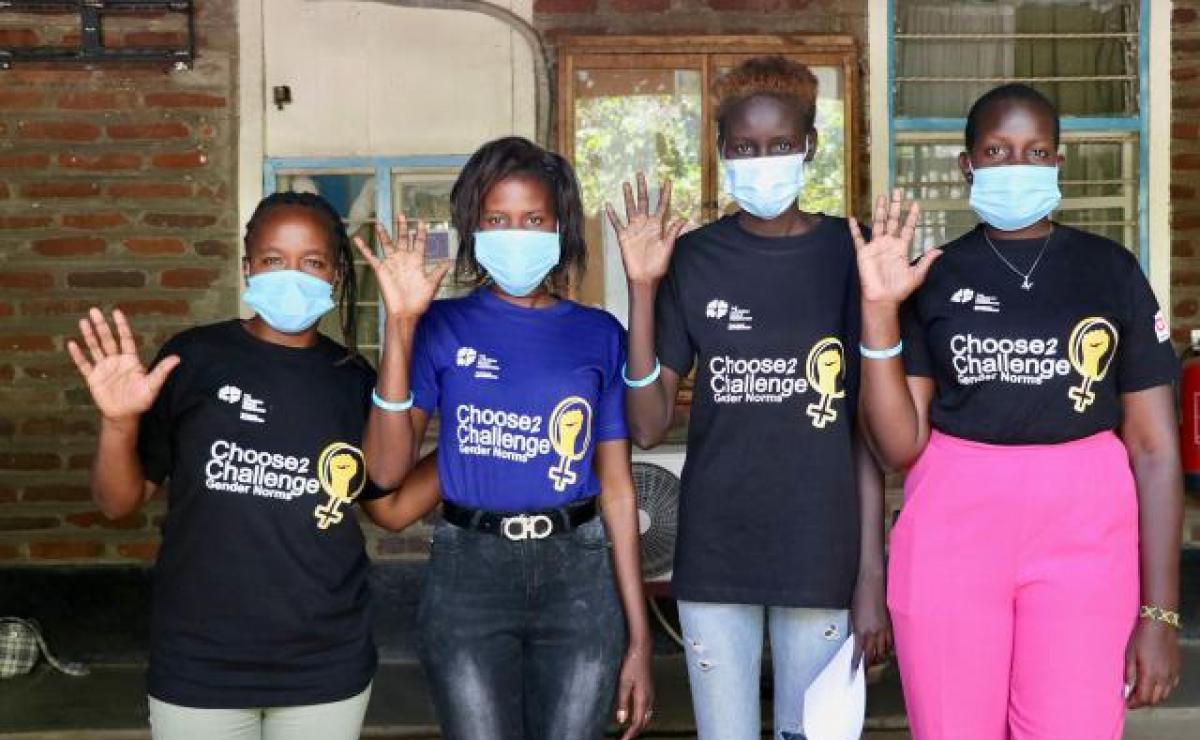Young women from Kakuma speak about gender justice

Webinar from refugee camp in Kenya, brings voices of young refugees
(LWI) - Young women in Kakuma refugee camp face many obstacles when aiming for equal opportunities as men and boys. In a webinar: “Emerging Women who Choose to Challenge”, young refugees and staff of the Lutheran World Federation (LWF) in Kakuma shared their daily struggles to realize their dreams and having careers of their choice.
“For women, to speak up is still a big challenge,” said Hilda Thuo, LWF Livelihoods Officer, Kakuma Area Program, and member of the LWF Kenya-Somalia gender action team. She underlined the importance of cultural dynamics in gender relations at Kakuma refugee camp. “Many communities still adhere to cultural practices which hinder women in attaining their goals.”
The webinar was organized by LWF Kenya, on the occasion of International Women’s Day on 8 March. LWF in Kenya is the main implementing organization for education in Kakuma and Dadaab refugee camps. Girls work, boys learn
During the session, young refugee leaders from Kakuma talked about challenges girls and women face in the camp. Many are systemic and start at an early age: female students are forced to neglect their studies in favor of household chores. This makes it harder for them to keep up with school work and to participate in activities outside their home. “The girls work, while boys are allowed to go to school,” said Biliny Manyaga, a South Sudanese model and youth leader in Kakuma refugee camp.
With the “Choose to challenge” campaign, young women in Kakuma refugee camps publicly question cultural norms which keep women from realizing their potential. Photo: LWF/ P. Omagwa
Teenage girls are in danger of being forced into an early marriage, so the family can receive a dowry. Women who are illiterate or don’t speak English are less likely to be considered for jobs. Husbands and stepfathers decide if the women are allowed to work outside their home, they control the family income, and often even the reproductive health of the women. “When women speak up, they are beaten,” Biliny has observed. “They don’t have rights; they don’t have a voice in the family. Girls are merely considered a source of wealth (through their dowry).”
Mainstream gender
LWF is addressing many of these issues, through peer mentoring programs, counselling groups, and referral systems for sexual and gender-based violence, said Saara Vuorensola-Barnes, LWF country representative in the Kenya-Somalia program.
“Gender justice is an aspect in all our work,” she said, recounting how LWF works to make sure girls finish primary school, go onto secondary, and even beyond. Livelihood projects and youth programming have integrated mechanisms to protect women and girls, and make sure they can realize their potential.
Empower economically
The young refugee leaders said more boarding schools were needed, also for over-age learners. They also called for empowerment on reproductive health. Something as basic as the lack of sanitary pads causes girls to miss a week of school every month. The young women repeatedly talked about a shortage of personal hygiene items since December because of COVID-19 restrictions.
“Leadership happens at all levels,” LWF World Service director Maria Immonen said in a keynote address. She encouraged the young women in Kenya to use the opportunities and spaces they had, by sharing knowledge and supporting each other.
All participants agreed that economic empowerment is vital to supporting women in attaining leadership . Support for female students, scholarships for tertiary education and capacity building are needed to address this inequality.
This is also visible in the schools – only few teachers are female, thus depriving the girls of role models and support. “We need more female role models,” said Awak Duet, a young volunteer teacher and business owner in the camp. She hopes that some of the successful athletes originating from the Kakuma soccer and basketball teams will come back and share the secrets of their success. This would motivate other girls to aim higher, and try to achieve more, she added: “We need for successful women to come to the community, and tell the girls how they made it.”
LWF/ C. Kästner
LWF in Kenya is the main implementing organization for education in Kakuma and Dadaab refugee camps. More than 100,000 students learn in schools managed by LWF. In addition, LWF also implements sports and cultural activities for young people in Kakuma, like Kakuma Premier League, basketball teams, and the annual edition of “Kakuma Got Talent”.

